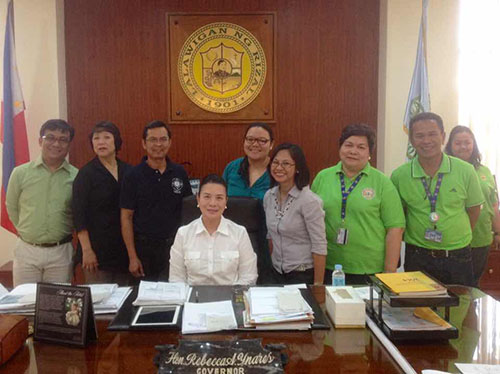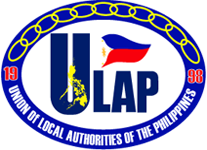Partnership Signing Agreement with Municipality of Javier, Leyte on the implementation of the Residential Free Patent Act (RA10023)
 The Union of Local Authorities of the Philippines (ULAP; represented by ULAP Secretary General and Liga ng mga Barangay National President Board Member Atty Edmund Abesamis) in partnership with The Asia Foundation, Foundation for Economic Freedom, and the AustralianAID held its partnership signing agreement with the municipality of Javier, Leyte led by Mayor Leonardo Javier, on February 27, 2015 at Milkyway Cafe, Makati City.
The Union of Local Authorities of the Philippines (ULAP; represented by ULAP Secretary General and Liga ng mga Barangay National President Board Member Atty Edmund Abesamis) in partnership with The Asia Foundation, Foundation for Economic Freedom, and the AustralianAID held its partnership signing agreement with the municipality of Javier, Leyte led by Mayor Leonardo Javier, on February 27, 2015 at Milkyway Cafe, Makati City.
The project aims to increase and expedite the land titling process with the implementation of the Residential Free Patent Act (RA10023). Through the initiative of Mayor Leonardo Javier and with the help of the DENR, LMB, PENRO, and other agencies involved, land titles will start to be awarded in April 2015. As a result, residents of untitled land will have full ownership of their residential lands. The project will also help increase the revenue of the municipality from additional real estate taxes to be collected. Mayor Javier, as the incumbent president of the League of Municipalities of the Philippines, will encourage all the municipalities under his leadership to adapt the project as well.
Also present during the signing agreement are: Geoff King, Counsellor at the Australian Department of Foreign Affairs and Trade; Ky Johnson, Senior Deputy Representative of The Asia Foundation; Calixto Chikiamco, President of the Foundation for Economic Freedom; Jaime Faustino, Program Director of The Asia Foundation; Engr. Winston Solitee, Director of DENR Region VIII; Engr. Ralph Pablo, Director of the Land Management Bureau; and the support staff from ULAP, The Asia Foundation, Foundation for Economic Freedom, Australian Aid, and the LGU of Javier, Leyte.
ULAP's Health Coalition Cited as Collective Effort in Addressing Local Health Issues in ASMPH Dean Column
The Union of Local Authorities of the Philippines' (ULAP) co-convened "162 to 52 Health Coalition on Accelerating Collective Action to Achieve Maternal and Child Health" is cited by Ateneo School of Medicine and Public Health (ASMPH) Dean, and former DOH Secretary, Manuel Dayrit in his column in SciDev. The Coalition work is referred to as a sign that collective action isbeing done to address health issues in the local level.
Dean Dayrit also represents ASMPH as one of the Lead Conveners of the Coalition. Other lead conveners are DOH, ULAP, Zuellig Family Foundation, PhilHealth, Access Health Philippines, Microsoft Philippines, and the Commission on Population.
The Coalition seeks to develop joint programs among its member organizations from the private groups, civil society organizations, and government agencies to increase interventions in areas in need. Moreover, through ULAP's membership in key policy platforms with national government agencies on health (i.e., DOH, PhilHealth), the Coalition provides policy inputs through conversations and technical reports.
ULAP join hands with the rest of the world in the celebration of the National Rare Disease Week, Feb. 22-28 with the theme “Living with Rare Disease: Day-by-day, Hand in hand”.
 The Union of Local Authorities of the Philippines (ULAP), with our continued advocacies for health and partnership with private and civil society organizations (CSOs), is in partnership with the the Philippines Soceity for Orphan Disorders, Inc., (PSOD), which has taken the initiative to be the central coordinating organization for the rare disease awareness week campaign in the country, bringing together different healthcare institutions, local government units, government agencies, civic organizations, media and other private and public institutions since 2011, to be united in creating awareness and support for Filipinos with rare disease.
The Union of Local Authorities of the Philippines (ULAP), with our continued advocacies for health and partnership with private and civil society organizations (CSOs), is in partnership with the the Philippines Soceity for Orphan Disorders, Inc., (PSOD), which has taken the initiative to be the central coordinating organization for the rare disease awareness week campaign in the country, bringing together different healthcare institutions, local government units, government agencies, civic organizations, media and other private and public institutions since 2011, to be united in creating awareness and support for Filipinos with rare disease.
Come February 28, 2015 the world will celebrate the 8th international Rare Disease Day with the theme “Living with Rare Disease: Day-by-day, hand-in-hand”. Over 80 countries participate in this occasion to raise awareness and to generate much needed support for those afflicted with rare disease (otherwise known as orphan disorder).
In 2010, the last week of February was declared as the “National Rare Disease Week” in the Philippines through Presidential Proclamation 1989. This year, on February 21-28, the Philippines will be celebrating the 6th National Rare Disease Week joining hands with the rest of the world in the celebration of the 8th Rare Disease Day with the same theme.
Click the following link to view the Philippine country site: http://www.rarediseaseday.org/country/ph/philippines
ISOGP ver.2 Partners Networking Event held Feb.27, 2015
 ULAP, in partnership with the Philippine Open Government Partnership (PHL-OGP) Steering Committee, DBM-Open Data Philippines, DOST-ICTO, Microsoft Philippines, Lee Kuan Yew School of Public Policy, National University of Singapore, PhilGEPS, PLDT Alpha Enterprise, Galing Pook Foundation, Ayala Foundation, Access Health International – Philippines, Civika Foundation, and 162 to 52 Coalition for Accelerating Collective Action towards Achieving Maternal and Child Heath, conducted a forum entitled “Innovative Solutions to Open Government Partnerships ver. 2.0” on February 27, 2015 at Microsoft Philippines Office, 8th Floor, 6750 Office Tower, Ayala Avenue, Makati City.
ULAP, in partnership with the Philippine Open Government Partnership (PHL-OGP) Steering Committee, DBM-Open Data Philippines, DOST-ICTO, Microsoft Philippines, Lee Kuan Yew School of Public Policy, National University of Singapore, PhilGEPS, PLDT Alpha Enterprise, Galing Pook Foundation, Ayala Foundation, Access Health International – Philippines, Civika Foundation, and 162 to 52 Coalition for Accelerating Collective Action towards Achieving Maternal and Child Heath, conducted a forum entitled “Innovative Solutions to Open Government Partnerships ver. 2.0” on February 27, 2015 at Microsoft Philippines Office, 8th Floor, 6750 Office Tower, Ayala Avenue, Makati City.
The networking event gathered partners from the government agencies, private organizations, and CSOs to link with LGUs for solutions targeted to increase capacities of LGUs on contributing to the achievement of the Philippines' Open Government Partnership Commitments.
ISOGP gathered around a total of 120 participants, for which 90 came from the LGUs of Region 3 (Central Luzon), Region 4-A (CALABARZON), Region 4-B (MIMAROPA), Region 5 (Bicol) and National Capital Region (NCR).
ISOGP ver.2 is another follow through event to the Good Governance Dialogues Regional Fora conducted by ULAP, in partnership with the Office of the President, Phil-OGP, DBM, USAID FPI-DAI and InciteGov last September to October 2014.
The two earlier ISOGP fora was conducted on November 28 in Makati City and December 4, 2014 in Cebu City.
JMDI Orientation with Gov. Rebecca Ynares, Rizal Province
 The Union of Local Authorities of the Philippines (ULAP), together with one of the lead project partner, NEDA Region 4A, conducted a consultation with Gov. Rebecca Ynares of the Provincial Government of Rizal on February 12, 2015 for the implementation of Joint Migration and Development Initiative Phase 2 (SUMMID CALABARZON).
The Union of Local Authorities of the Philippines (ULAP), together with one of the lead project partner, NEDA Region 4A, conducted a consultation with Gov. Rebecca Ynares of the Provincial Government of Rizal on February 12, 2015 for the implementation of Joint Migration and Development Initiative Phase 2 (SUMMID CALABARZON).
SUMMID Calabarzon aims to strengthen, upscale and mainstream migration and development in the local level through inclusive and sustainable programs that will minimize social cost and maximize gains of overseas migration. This project is funded by the European Union and the Swiss Agency for Development and Cooperation with the United Nations Development Programme.
ULAP's others partners in JMDI Phase 2 involve the following agencies and organizations: Committee on Migration and Development IV-A (CALABARZON) c/o National Economic and Development Authority (NEDA) Regional Office IV-A as the main lead partner; and Atikha Overseas Workers and Communities Initiatives Inc, Commission on Filipino Overseas (CFO), and Local Government Academy (LGA).
IFAD Tarlac PinoyWise Multistakeholder Orientation

Representatives from offices of Tarlac Provincial Government, cooperatives, local colleges, and other sectors actively participated during the MSG orientation workshop.
Tarlac is one of the pilot sites of PINOY WISE (Worldwide Initiative on Investments, Savings, and Entrepreneurship) that ULAP implemented with Atikha in 2012. From 2015 onwards, the migration and development project will be scaled up with the support of the International Fund for Agricultural Development (IFAD), to concretely mainstream migration in local economic development.



